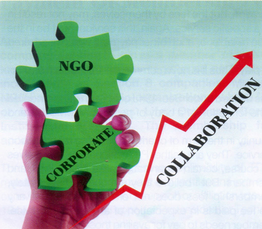|
The Indian Companies Act 2013 has considerably impacted the relationship that companies used to have with NGOs. From acting as ‘benevolent giver’ to ‘grateful beneficiaries (NGOs)’ the relationship has evolved to one of partnership and collaborative action. In fact, under the CSR Rules NGOs are referred to as the company's “implanting agency” for CSR activities. However, despite statutory and other regulations there is still lack of understanding, appreciation and trust between Companies & NGOs. This essentially stems from lack of clarity of roles & responsibilities on both sides and because both parties are often unsure about ‘goals’ & ‘benefits’.
What is CSR? Essentially, CSR is the process by which an organization thinks about and evolves its relationships with stakeholders for the common good, and demonstrates its commitment in this regard by adoption of appropriate business processes and strategies. Thus, quite clearly, CSR is not charity or merely an act of giving donations. Yet, many NGOs still hope that companies will ‘donate’ fund to them to sustain their ‘good work’. This is a ‘myth’ that must be dispelled. CSR is a way of conducting business, by which corporate entities visibly contribute to the social good. Socially responsible companies do not limit themselves to using resources to engage in activities that increase only their profits. They use CSR to integrate economic, environmental and social objectives with the company's operations and growth. The CSR Rules make it clear that, “CSR activities may generally be conducted as projects or programs (either new or ongoing) excluding activities undertaken in pursuance of the normal course of business of a company.” What Makes for Good CSR?
Due Diligence Due Diligence is an exercise that both companies and NGOs must conduct before collaborating. Due diligence is simply an investigation or audit of a potential social investment and it serves to confirm all material facts in regards to a partnership. It refers to the care a reasonable person should take before entering into an agreement or a transaction with another party. While companies could conduct legal and fiscal due diligence checks on NGOs, the NGOs too should exercise diligence in studying the company's CSR Policy and CSR reports for previous years. Legal, Fiscal & Tax Aspects to Consider
i. The project/program meets the requirement of “Specified CSR Activity” as listed under Schedule VII of the Indian Companies Act 2013; ii. The project/program is in sync with the company's CSR Policy; iii. The project/program as far as possible is in the local area and areas around where the company operates.
Essentials for collaborating! Collaboration calls for investment of time and energy in the relationship and making it work. Corporate houses all over the world are realizing that “money” is not the only corporate resource that they can provide to social development initiatives. Today, the role of a grant-maker, be it a company or a corporate foundation, has graduated from a “giver” (of funds) to an investor in social change and community development. Voluntary organizations, on the other hand, are now increasingly being viewed as the investor's “partner in change”. The relationship is symbiotic. Voluntary organizations have ideas and the capacity to solve problems, but little or no money with which to implement them. Grant-making foundations and corporations have the financial resources but hardly the time, inclination, skills or the human resource to create, implement and sustain programs. When the two come together, the result is a dynamic collaboration. Like in human relationships, the corporate-NGO relationship should be based on equality, mutual respect and trust. Both partners should be open to new ideas and receptive to constructive criticism. Grant -makers should be careful in maintaining their supportive role without getting involved in implementation. Voluntary organizations should enjoy the freedom to work according to their own style. However, disclosure of information, both as required by law and voluntary reporting is the most powerful mechanism for public accountability of voluntary organizations. It is important for voluntary organizations to re-assess the need for greater openness as part of their obligation to exhibit leadership in living up to the highest standards of accountability. Effective Communications, good governance, full accountability and transparency are an integral part of good partnership. Noshir Dadrawala CENTRE FOR ADVANCEMENT OF PHILANTHROPY [email protected] www.capindia.in |
Categories
All
Social Work Learning Academy50,000 HR PROFESSIONALS ARE CONNECTED THROUGH OUR NIRATHANKA HR GROUPS.
YOU CAN ALSO JOIN AND PARTICIPATE IN OUR GROUP DISCUSSIONS. MHR LEARNING ACADEMYGet it on Google Play store
|
SITE MAP
SiteTRAININGJOB |
HR SERVICESOTHER SERVICESnIRATHANKA CITIZENS CONNECT |
NIRATHANKAPOSHOUR OTHER WEBSITESSubscribe |
MHR LEARNING ACADEMY
50,000 HR AND SOCIAL WORK PROFESSIONALS ARE CONNECTED THROUGH OUR NIRATHANKA HR GROUPS.
YOU CAN ALSO JOIN AND PARTICIPATE IN OUR GROUP DISCUSSIONS.
YOU CAN ALSO JOIN AND PARTICIPATE IN OUR GROUP DISCUSSIONS.
|
|







 RSS Feed
RSS Feed





